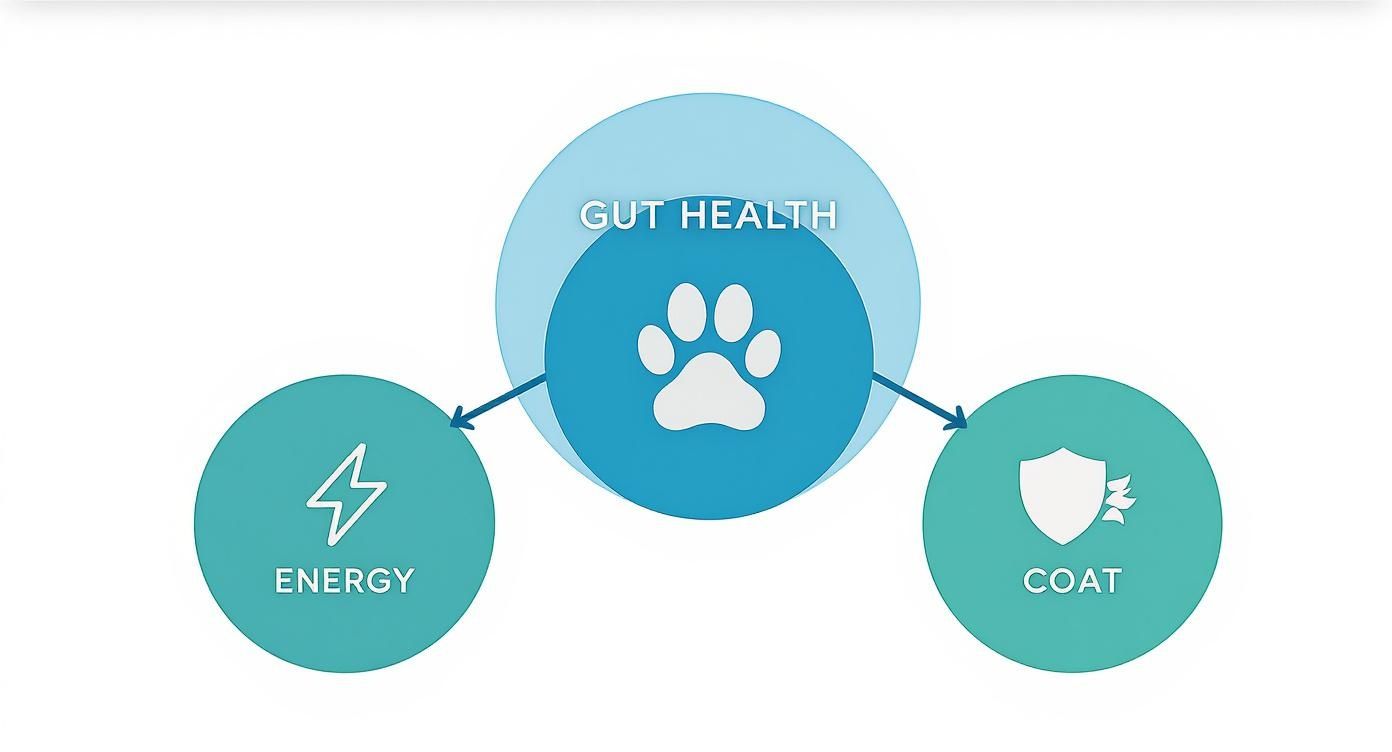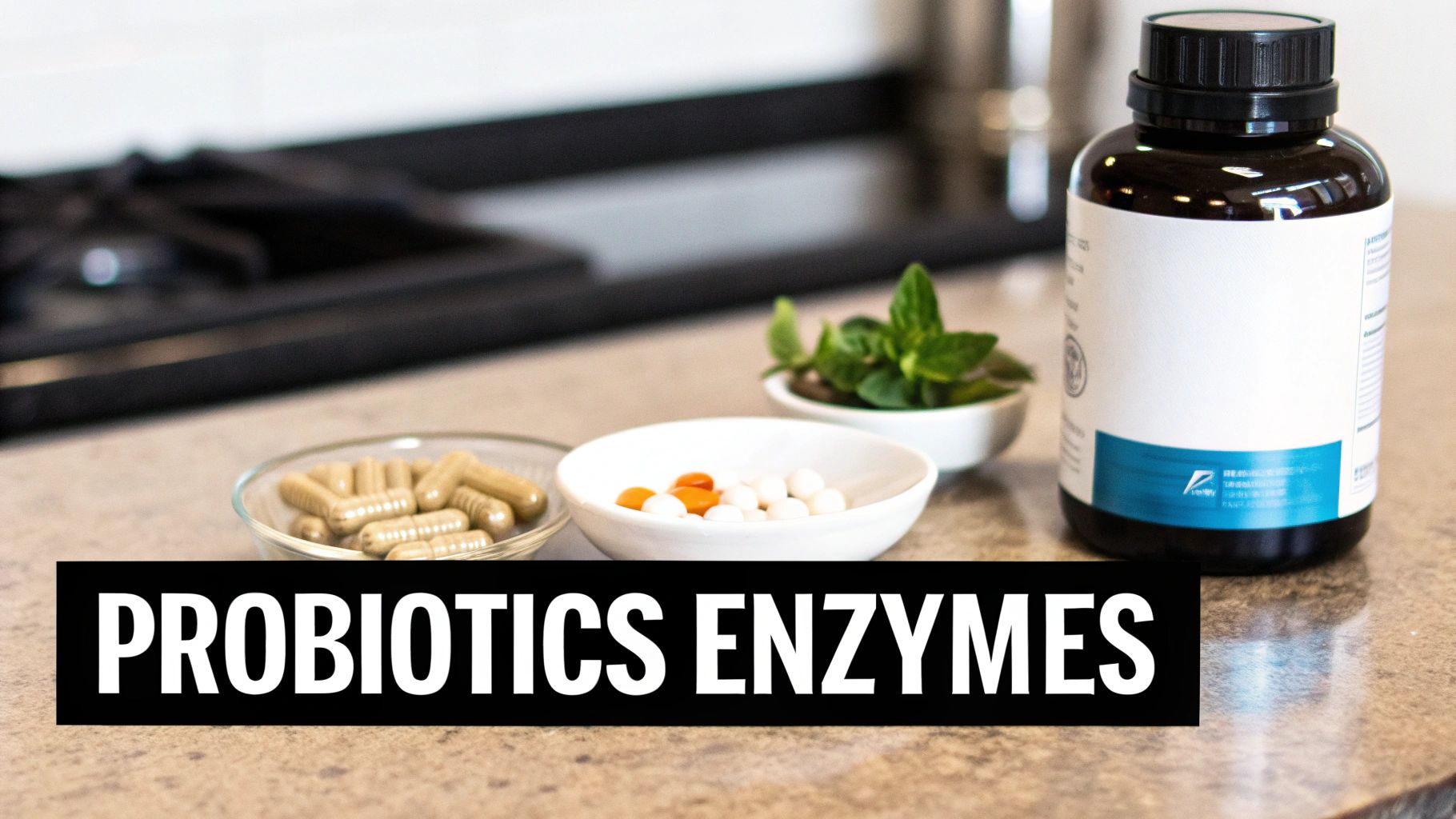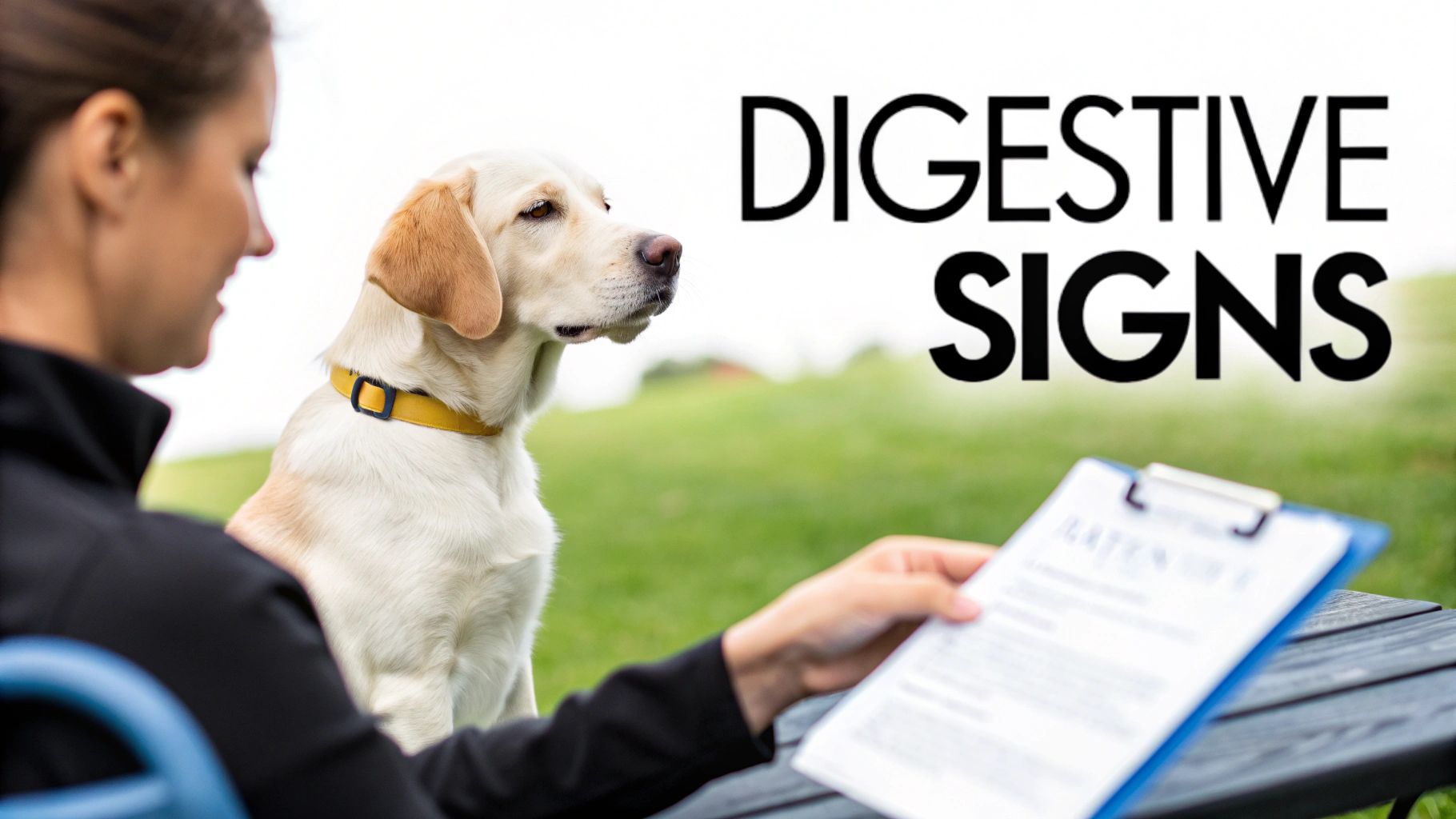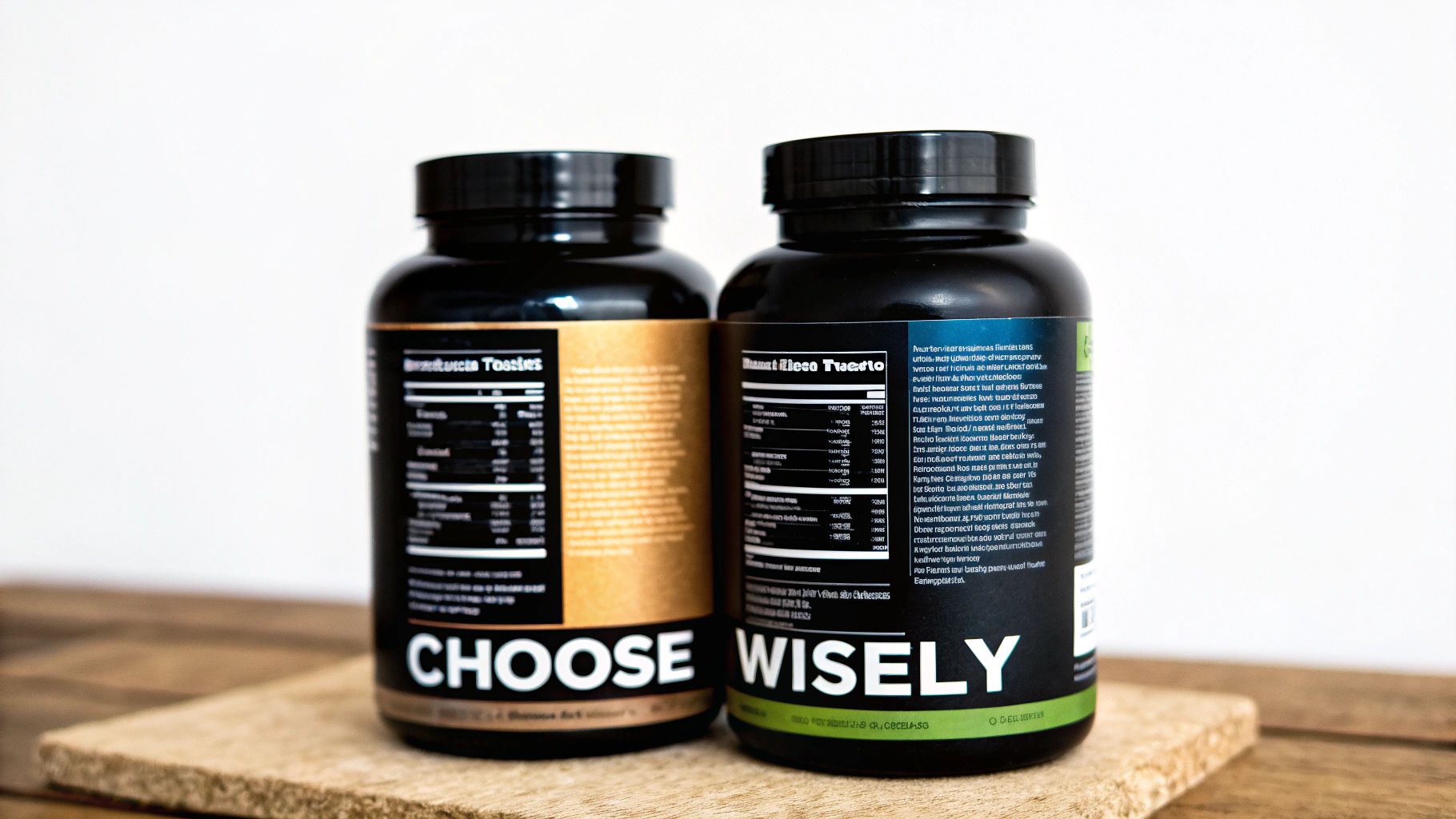
Your Guide to Dog Digestive Supplements
Dog digestive supplements are pretty straightforward: they're products packed with ingredients like probiotics, enzymes, and fiber to help support a healthy gut. They’re designed to improve how well your dog absorbs nutrients from their food, keep their bathroom habits regular, and ultimately boost their overall health.
Why Your Dog's Digestive Health Matters
It’s easy to think of a dog's digestive system as just a food processor, but it’s so much more than that. I like to think of it as the central command center for their entire body. This complex ecosystem is in charge of breaking down meals, pulling out all the good stuff, and getting rid of the waste. When it’s running like a well-oiled machine, you see the results: a dog full of energy, a beautiful shiny coat, and a strong immune system.
Inside that system is a whole world known as the gut microbiome, home to trillions of tiny microorganisms. A healthy gut keeps a careful balance between the good bacteria and the potentially harmful ones. But things like stress, a poor diet, getting older, or even a round of antibiotics can throw that delicate balance out of whack.
The Foundation of Overall Wellbeing
When your dog's gut is off-kilter, the effects can show up all over their body. It’s not always as obvious as an upset stomach. An unhealthy gut can be the sneaky root cause of issues that don't seem connected at all.
Here’s why: a huge portion—around 70%—of your dog's immune system is located right there in their gut. That incredible link means digestive health has a direct line to their ability to fend off illnesses and bounce back from injuries.
Seeing it this way helps shift our thinking. Caring for their digestion isn't just about reacting to tummy troubles; it's a proactive strategy for their long-term health. A happy gut is truly the foundation for a happy dog.
This graphic really helps visualize how a healthy gut supports other key areas of your dog's vitality.

As you can see, a balanced digestive system really is the cornerstone for great energy, a strong immune response, and a healthy skin and coat.
From Digestion to Daily Vigor
The whole process kicks off the second your dog takes a bite. Stomach acids start breaking down the food, and then it moves into the intestines where the real work begins. This is where nutrients are absorbed and sent off to fuel every single cell, muscle, and organ.
If that digestive process is sluggish or inefficient, your dog simply can't get all the goodness from their food, no matter how premium it is. This is exactly where dog digestive supplements can make a difference. They offer targeted support to help keep that crucial gut balance in check. To dive deeper into how diet fits into this puzzle, take a look at our guide on the best dog food for digestive health.
A dog’s gut is a powerful indicator of their overall health. Seemingly small issues like excessive gas or inconsistent stools can be early signs that the internal ecosystem needs support before more significant problems arise.
For those dogs who wolf down their food—which often leads to gas and indigestion—incorporating slow feeder bowls into their routine can be a simple, effective first step. By focusing on the gut, you’re not just chasing symptoms; you’re nurturing the very core of their well-being.
Decoding the Ingredients in Digestive Supplements

Flipping over a supplement bottle can sometimes feel like trying to read a foreign language. The long list of scientific-sounding names might leave you scratching your head, wondering what you're really giving your dog.
The trick is to see these ingredients less as a confusing list and more as a coordinated team. Each one has a specific job, and when they work together, they create a powerful support system for your dog’s gut health. Let’s break down the key players you'll find in high-quality dog digestive supplements.
Probiotics: The Good Bacteria
At the very heart of most digestive aids are probiotics. These are the good guys—live, beneficial bacteria that act as reinforcements for your dog's natural gut flora. Think of them as tiny guardians that help maintain a healthy, balanced environment and keep the troublemaking bacteria in check.
Not all probiotics are the same, though. Different strains have different specialties; some are champions at promoting regular bowel movements, while others are all-stars at supporting the immune system. This is why you'll often see several strains listed on a label. To dive deeper into which strains do what, check out our guide on the best probiotics for dogs.
Prebiotics: The Fuel for the Good Guys
If probiotics are the friendly bacteria, then prebiotics are their packed lunch. These are specific types of plant fibers that your dog can't digest, but the good bacteria in their gut absolutely love to eat.
By feeding the beneficial bacteria, prebiotics create the perfect conditions for them to not just survive, but to truly flourish and multiply. You’ll see them on labels as ingredients like Fructooligosaccharides (FOS) or inulin, which is often sourced from chicory root.
By providing the necessary fuel, prebiotics act as a powerful amplifier for the effects of probiotics. A supplement that contains both is known as a synbiotic, offering a more complete approach to gut health management.
This partnership is what creates lasting change. Without their fuel source, even the best probiotics can struggle to get a foothold in the gut.
Digestive Enzymes: The Tiny Helpers
The third key player is a group of proteins called digestive enzymes. Picture them as tiny, highly efficient scissors that snip apart large food molecules—like proteins, fats, and carbs—into smaller pieces that the body can actually absorb.
While your dog's body makes its own enzymes, sometimes a little extra help is needed, especially if they eat a highly processed diet or are getting older.
To help you get familiar with what you're seeing on labels, here's a quick rundown of the most common digestive support ingredients and what they do.
Common Digestive Supplement Ingredients and Their Functions
| Ingredient Type | What It Is | Primary Function in Dogs |
|---|---|---|
| Probiotics | Live, beneficial bacteria (e.g., Lactobacillus acidophilus, Bifidobacterium animalis) | Help balance the gut microbiome, support immune function, and promote regular digestion. |
| Prebiotics | Non-digestible fibers (e.g., Fructooligosaccharides (FOS), inulin, chicory root) | Act as a food source for probiotics, helping them thrive and multiply in the gut. |
| Amylase | A digestive enzyme | Breaks down starches and complex carbohydrates into simple sugars for energy. |
| Protease | A digestive enzyme | Breaks down proteins into smaller amino acids, which are crucial for muscle and tissue repair. |
| Lipase | A digestive enzyme | Breaks down fats and oils into fatty acids that can be absorbed and used by the body. |
| Cellulase | A digestive enzyme | Helps break down cellulose, the tough fiber found in plant cell walls. |
By helping with this breakdown process, enzymes ensure your dog is wringing every last drop of nutritional value out of their food. This can lead to better energy, a healthier coat, and improved stool quality.
It’s no surprise that pet parents are catching on. The dog intestinal health supplement market was valued at around USD 37.8 billion in 2025 and is expected to hit USD 59.9 billion by 2035. This boom shows a real shift in understanding just how critical gut health is.
This same transparency should apply to everything your dog eats, which is why it’s a good idea to know the major reasons why you should read dog treat ingredient labels, too. At JoyFull, that's our whole philosophy—we focus on clean, science-reviewed formulations so you never have to guess what you’re giving your best friend.
Recognizing the Signs of Digestive Distress

Wouldn't it be great if our dogs could just tell us, "Hey, my stomach feels a little off today"? Since they can't, it’s on us to become savvy detectives, picking up on the clues they give us through their behavior and body. Digestive trouble isn't always as dramatic as a sudden bout of diarrhea; more often, the signs are subtle—little things that are easy to brush off as just "a dog being a dog."
Catching these signals early is crucial for getting ahead of a small imbalance before it snowballs into a bigger problem. Paying close attention helps you spot when your dog might benefit from the backup of dog digestive supplements and, just as importantly, when it’s time to call the vet.
The Obvious Red Flags
Some signs of an unhappy gut are impossible to miss. These are the classic, in-your-face symptoms that scream something is wrong with your dog's digestive system. While a single, isolated incident might not be cause for panic, if you see them happening repeatedly, it’s definitely time to take a closer look.
Keep an eye out for these clear indicators:
- Diarrhea or Loose Stools: This is the number one sign of digestive upset. Persistent loose stools mean food is rushing through the intestines too quickly, so your dog isn't absorbing the nutrients and water they need.
- Vomiting or Regurgitation: Dogs sometimes vomit after eating grass or something they shouldn't have. But frequent or chronic vomiting points to a deeper irritation or inflammation in the stomach or upper intestine.
- Constipation: If you notice your dog straining to go, producing small, hard stools, or going less often than their normal schedule, it suggests their digestive motility has slowed way down.
These symptoms are your dog's way of sending up a flare. If they stick around for more than a day or two, or if your dog seems tired and isn't interested in food, a vet visit is the next step.
The Quieter, Sneakier Symptoms
Beyond the obvious stuff, a lot of signs of poor gut health fly completely under the radar. These subtle clues often build up so gradually that we mistake them for personality quirks or just a normal part of getting older. In reality, they're often the earliest warnings that their internal ecosystem is out of whack.
Think of these as whispers from your dog's gut, telling you it could use some help. A high-quality digestive supplement can often help rebalance the system and quiet these whispers down.
Your dog’s gut health is tied to their entire body. An imbalance in their gut microbiome can show up in ways that seem totally unrelated to digestion, like itchy skin or even moodiness.
Learning to tune into these quieter signals allows you to be a more proactive partner in your dog's health.
A Head-to-Tail Checklist for Gut Health
Use this quick observational guide to get a full picture of your dog's digestive wellness. If you find yourself nodding along to several of these points, it’s a strong sign their gut could use some extra support.
- Excessive Gas (Flatulence): Sure, all dogs pass gas. But if it's constant or could clear a room, it often means food isn't being digested properly and is fermenting in the colon instead.
- Gurgling Stomach Noises (Borborygmi): Loud, frequent tummy rumbles when your dog isn't hungry can indicate a lot of gas moving through the intestines.
- Bad Breath (Halitosis): If your dog’s breath is consistently awful even with good dental care, the problem could be coming from their gut. An imbalance of bacteria can produce smelly sulfur compounds that travel right up the digestive tract.
- Changes in Appetite: Suddenly becoming a picky eater or losing interest in food altogether can be a sign of nausea or abdominal discomfort.
- Poor Coat Quality: A dull, dry coat, flaky skin, or excessive shedding can be linked directly to poor nutrient absorption in the gut. They aren't getting the building blocks for healthy skin and fur.
- Low Energy or Lethargy: When your dog isn't properly digesting their food, they aren't getting the fuel they need to thrive. The result? A dog that seems tired all the time.
Understanding the unique challenges of dogs with sensitive systems can give you even more insight. For a deeper look, check out our guide on caring for a dog with a sensitive stomach. By connecting these dots, you can shift from just reacting to problems to proactively building up your dog’s core health from the inside out.
How to Choose the Best Digestive Supplement

Walking down the supplement aisle—or scrolling through endless online options—can be overwhelming. So many bottles, so many promises. How do you cut through the marketing noise and find a product that you can actually trust?
It's not about picking the one with the snazziest label. It’s about learning to read that label like a pro and understanding what truly matters for your dog's health. Think of it as gaining a new skill, one that empowers you to make a great choice for your best friend.
Look for Transparency and Quality Seals
The first sign of a good company is how open they are about what’s inside the bottle. If a brand is cagey about its ingredients or uses vague language, that’s your first red flag. Reputable manufacturers are proud of their formulas and make it easy for you to see exactly what you're getting.
One of the best shortcuts to finding a trustworthy product is to look for a quality seal from a third-party organization.
The NASC Quality Seal from the National Animal Supplement Council is the gold standard in this space. This little seal means the company has passed a rigorous, independent audit of its manufacturing process, quality control, and labeling practices.
When you see that seal, you know the brand is serious about safety and transparency. It’s a simple, powerful way to filter out the questionable stuff and focus on products that have proven their commitment to high standards.
Decode the Ingredient Label
Once you've spotted a brand that looks promising, it’s time to put on your detective hat and dig into the ingredient label. Every single ingredient in a quality supplement should have a clear and beneficial purpose.
Here’s what you should be scanning for:
- Specific Probiotic Strains: Don’t settle for a generic "probiotic blend." Look for the specific names of the strains, like Bifidobacterium animalis or Lactobacillus acidophilus. Different strains perform different jobs in the gut, so a thoughtfully curated blend is a fantastic sign.
- Guaranteed Analysis: A good product will have a "Guaranteed Analysis" section that tells you the minimum amount of each active ingredient. For probiotics, this is usually measured in Colony Forming Units (CFUs). This is your proof that the supplement contains a potent, effective dose.
- Clean Inactive Ingredients: Flip the bottle over and check the "inactive ingredients." You want to see simple, recognizable things used for texture or taste, like sunflower lecithin or natural chicken flavor. Steer clear of products packed with artificial colors, chemical preservatives (like BHA or BHT), or cheap fillers like corn and soy.
This level of detail is what separates a carefully crafted supplement from one that’s just a mishmash of low-cost ingredients.
Red Flags to Avoid on the Shelf
Knowing what to look for is half the battle; knowing what to avoid is the other half. Certain marketing terms and formulation tricks are common with lower-quality products and should give you pause.
Be on the lookout for these red flags:
- Proprietary Blends: This term sounds fancy, but it’s often used to hide the exact amount of each ingredient in a mix. It prevents you from knowing if your dog is getting a therapeutic dose of the important stuff or just a sprinkle.
- Artificial Additives: There’s simply no need for artificial colors (like Red 40), flavors, or sweeteners in a health supplement. At best they’re useless, and at worst they can cause digestive upset or allergic reactions.
- Vague Sourcing: If a company isn't upfront about where its ingredients come from, that’s a reason for concern. The best brands are proud to share their sourcing practices with you.
As more of us prioritize our pets' health, the supplement market has exploded. Digestive aids are a huge part of this trend, with dogs accounting for about 45.7% of the revenue. And while chews are the most popular format—making up 39% of the market—it's the quality of the ingredients that really counts. You can explore more pet supplement market trends in this detailed report.
At JoyFull, this commitment to transparency is at the core of everything we do. We believe you should never have to wonder what’s in your dog's supplement. That's why we focus on clean ingredients and science-reviewed formulations, giving you the peace of mind that you’re making the best possible choice for your dog's well-being.
Partnering with Your Vet on Gut Health
While it's great to be proactive about your dog's gut health, dog digestive supplements aren't a solo mission. Your most important partner in this process is always your veterinarian. They have the full story on your dog's health—their history, current medications, and unique sensitivities—which makes their advice absolutely crucial.
Think of it this way: a supplement is just one piece of the puzzle. Your vet is the one who can see the whole picture and knows exactly where, or even if, that piece fits. Before you start your dog on anything new, a quick chat with your vet is the single most important step you can take.
Getting Ready for the Vet Visit
To get the most out of your appointment, do a little prep work. Jot down a list of what you've been noticing and any questions you have. This simple step can turn a routine check-up into a focused conversation about your dog’s digestive wellness.
Your vet can offer personalized advice that a product label or an online article never could. It's about being a responsible, informed pet parent and making sure every choice you make is the right one for your best friend.
Your vet’s first job is to rule out any serious health issues. Sometimes, what looks like a simple tummy ache can be a sign of something more. Supplements are for supporting wellness, not for self-diagnosing an underlying medical condition.
The interest in gut health is exploding. The market for dog probiotic supplements alone was valued at around USD 467.3 million and is expected to climb to USD 1,067.6 million by 2035. With so many products out there, professional guidance is more important than ever. You can discover more insights about the expanding dog probiotic market to see just how fast this area is growing.
Key Questions to Ask Your Veterinarian
Walk into your appointment prepared. Having these questions ready will help you leave with a clear, confident plan.
- Is This the Right Time? "Given my dog's symptoms and overall health, do you think a digestive supplement is a good idea right now?"
- What Should I Look For? "Are there specific ingredients, like certain probiotic strains or enzymes, that you'd recommend for my dog's situation?"
- How Should I Give It? "What's the right starting dose for my dog's size, and how should we adjust it if needed?"
- Any Potential Conflicts? "Could this supplement interfere with any medications or other supplements my dog is already on?"
- What Changes Should I Watch For? "What positive signs should I be looking for, and how long does it typically take to see a difference?"
When you work closely with your vet, you're no longer just guessing—you become a true advocate for your dog's health.
Common Questions About Digestive Supplements
Even with a good grasp of the benefits, it's totally normal to have a few more questions before adding something new to your dog's daily routine. When you're talking about their health, you want to be sure you're making the right call.
We get it. Feeling confident in your choices is a huge part of being a great dog parent. So, let’s tackle some of the most common questions we hear from owners about dog digestive supplements. Think of this as your quick-reference guide for those last-minute "what ifs."
How Long Does It Take for Supplements to Work?
This is usually the first thing people ask. It's crucial to remember that supplements aren't a magic wand; they work by supporting your dog's natural systems over time. How quickly you see results really depends on the dog and the situation.
The timeline hinges on a few key things:
- Your Dog's Starting Point: A dog with a little bit of gas now and then might feel better much faster than a dog dealing with chronic loose stools.
- The Supplement's Ingredients: A formula packed with digestive enzymes, for example, might offer fairly quick relief from that after-dinner bloating.
- Consistency: This is the big one. For ingredients like probiotics to truly take hold and rebalance the gut microbiome, you have to give them every single day.
For a temporary issue, like diarrhea from the stress of a car ride, you might see a difference in just a few days. But for more long-term goals, like improving overall stool quality or tackling gut-related skin problems, it’s more realistic to give it four to eight weeks to see significant changes.
It helps to think of it like tending a garden. You don't plant seeds and expect a full bloom the next morning. It takes consistent watering and care for those beneficial bacteria to grow, thrive, and create a healthier gut environment.
Can I Give My Dog a Human Probiotic?
This question comes up all the time, and it’s an important one. While it seems like a simple shortcut, giving your dog human probiotics is not a good idea. The main reason is simple: our digestive systems and our dogs' are built differently.
Dogs have a much shorter digestive tract and a completely unique community of gut bacteria. The best supplements for dogs are formulated with specific probiotic strains that are proven to benefit the canine gut, like Enterococcus faecium and Bifidobacterium animalis.
A dog's gut is a specialized environment. Using a human-formulated product is like trying to use the wrong key for a lock—it might fit, but it won't work properly and could even cause problems.
On top of that, many human supplements contain ingredients that are flat-out dangerous for dogs. A major one to watch for is xylitol, an artificial sweetener found in countless human vitamins and gummies that is extremely toxic to dogs, even in tiny amounts. Your safest bet is always to stick with products made specifically for them.
Are There Any Side Effects to Consider?
When used as directed, high-quality dog digestive supplements are generally very safe. That said, it’s possible to see a few mild, temporary side effects when you first start, especially if the supplement contains probiotics or a lot of fiber.
Think of it as an "adjustment period" while the gut microbiome gets used to all the new, good bacteria moving in.
During the first week or so, you might notice:
- A temporary increase in gas
- Slightly looser poop than usual
These effects are almost always mild and should clear up on their own as your dog's system adapts. A great tip is to start with a half dose for the first few days and gradually build up to the full recommended amount. If any side effects seem severe or last longer than a week or two, it's best to stop the supplement and check in with your vet.
Does Every Single Dog Need a Supplement?
Honestly, no. Not every dog requires a daily digestive supplement. A healthy adult dog with a rock-solid stomach who's eating a fantastic, well-balanced diet might be doing just fine on their own.
However, these supplements can be a total game-changer for a huge number of dogs, acting as both a proactive wellness tool and a solution for existing issues. They're especially helpful for dogs in certain situations or life stages.
A digestive supplement is often a fantastic choice for:
- Dogs with notoriously sensitive stomachs or known food intolerances.
- Pups who get stress-induced diarrhea from travel, boarding, or vet visits.
- Dogs on antibiotics (or who just finished a course), which can wipe out good gut flora.
- Senior dogs, whose natural digestive fire can start to fade with age.
- Dogs switching to a new food, to help make the transition smoother.
The best way to know for sure is to be a close observer of your dog and keep an open line of communication with your veterinarian. Together, you can decide if a supplement is the right tool to help your dog live their happiest, most comfortable life.
At JoyFull, our goal is to take the guesswork out of supporting your pet's health. We focus on clean, science-reviewed formulations so you can feel confident you’re providing the best, most effective support for their digestive well-being. Learn more at https://joyfullpet.com.

